Whedon's Commentary on the Old and New Testaments (14 vols.)
Digital Logos Edition
Overview
D. D. Whedon was an important nineteenth-century figure in the struggle between Calvinism and Arminianism. He devoted 25 years to completing his commentaries on the New Testament and, moreover, edited the Old Testament commentaries presented here. These commentaries—intended for popular use by laypeople—are comprehensive yet concise. They analyze the entire Bible, providing the background, history, message, and historical and contemporary relevance of each Old and New Testament book. Each volume includes introductions to the text, illustrations, and maps.
Scholarly yet readable, Whedon’s Commentary on the Old and New Testaments offers a comprehensive intellectual, historical, and spiritual survey of the riches found in God’s Word. In the Logos edition, each Scripture passage links to your favorite translation, and the volumes are easy to study side by side with your other commentaries. You can search by topic or Scripture passage with remarkably fast results.
This title is included in the following collections
You can save when you purchase this product as part of a collection.
Logos 8 Methodist & Wesleyan B...
$89.99$89.992025 Wesleyan Silver
$349.99$279.99Logos 8 Methodist & Wesleyan S...
$349.99$349.99Logos 7 Methodist & Wesleyan S...
$349.99$349.99
- $849.99$679.99
- $849.99
- $849.99
- $849.99
- $1,499.99$1,199.99
- $1,499.99
- $1,499.99
- $1,499.99
- $2,999.99$2,249.99
- $2,999.99
- $4,749.99$3,562.49
- $17,553.16$3,699.99
- $23,999.99$17,999.99
- $21,749.99
- $24,999.99

- Provides commentary on the entire Bible
- Includes introductions to each Old and New Testament book
- Contains numerous outlines, illustrations, and maps
The New Testament part of the series is the ablest Methodist commentary since the days of Adam Clarke, and is in many respects superior to that monumental work. The Old Testament books were committed to various scholars who have wrought well, but unequally, on their respective tasks.
—Southern Methodist Review
For the laborious work of construction, for accuracy of workmanship, and for general attraction of page, the present number of the series should be accepted with gratitude by the church.
—Methodist Review
[We] seldom get hold of a book of ‘Notes on the Scriptures’ that we feel like sitting down to read carefully through; yet such has been our desire with these successive volumes.
—Ladies’ Repository
In its own field it is matchless.
—N. W. Christian Advocate
- Title: Whedon’s Commentary on the Old and New Testaments
- Volumes: 14
- Pages: 7,021
Individual Titles
- Genesis and Exodus by Milton Spenser Terry and Fales H. Newhall
- Leviticus, Numbers, and Deuteronomy by Daniel Steele and John W. Lindsay
- Joshua to 2 Samuel by Milton Spenser Terry and Daniel Steele
- Kings to Esther by Milton Spenser Terry
- The Book of Psalms by F. G. Hibbard
- Job, Proverbs, Ecclesiastes, and Solomon’s Song by J. K. Burr, W. Hunter, and A. B. Hyde
- Isaiah, Jeremiah, and the Lamentations of Jeremiah by H. Bannister and F. D. Hemenway
- Ezekiel and Daniel by Camden M. Cobern
- The Minor Prophets by Frederick Carl Eiselen
- Matthew–Mark by D. D. Whedon
- Luke–John by D. D. Whedon
- Acts–Romans by D. D. Whedon
- 1 Corinthians–2 Timothy by D. D. Whedon
- Titus–Revelation by D. D. Whedon
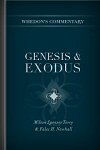
This volume includes comprehensive introductions to Genesis and Exodus, as well as an introduction to the Pentateuch as a whole. It contains exegetical and explanatory notes, illustrations, and tables.
Of the various popular commentaries that have appeared of late years on Genesis and Exodus, this is one of the very best. In a clear and simple manner it presents just such information as every Bible reader most requires. . . . all the best results of modern scholarship are embodied in its comments. For general use we know of no commentary on the books of which it treats superior to it.
—The Reformed Quarterly Review
Milton Spenser Terry was a Methodist Episcopal Church clergyman who held pastorates from 1868 to 1884. In 1884 he was elected to the chair of Hebrew and Old Testament exegesis at the Garret Biblical Institution in Evanston, Illinois. In 1871 he was elected to the American Oriental Society, and in 1883 he was elected to the Society of Biblical Literature and Exegesis.
Fales H. Newhall was the chair of English and instructor of Hebrew at Wesleyan University. He was also a professor of languages at Middletown College.
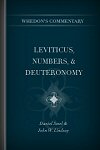
This volume provides a large view of early Hebrew history. Using philological, psychological, scientific, and historical methods of interpretation, the authors analyze the meaning and value of three Pentateuchal books. They respond to critical objection to Leviticus, Numbers, and Deuteronomy’s Mosaic origin and emphasize their important historical place in literature. The volume includes introductions to each book, as well as charts, outlines, and illustrations.
Without difficulty one may discover in its composition various of the qualities that go to make up the superior commentator . . . The book is sufficiently critical for the demands of the occasion.
—Methodist Review
The work has been executed with great care and with due reference to the results of scientific and historical criticism, so that it is fully abreast the biblical knowledge of the times in which we live. In tone it is throughout thoroughly evangelical.
—The Reformed Quarterly Review
Daniel Steele was a Bible scholar and theologian. He served as a professor of theology at Boston University. Later, he became the first president of Syracuse University, then Boston University.
John W. Lindsay taught theology, Semitic languages, Old Testament exegesis, and New Testament at Boston University.
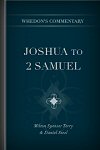
This exegetical commentary covers five Old Testament books: Joshua, Judges, Ruth, 1 Samuel, and 2 Samuel. Full of sound biblical criticism and research, it includes book introductions, charts, outlines, and illustrations.
The author has bestowed much thought upon his work. He has examined leading authorities, and has gathered his results in a form convenient for use. . . . We cannot doubt that this commentary will be regarded as well supplying a need. . . . Many teachers and private readers are glad to get such helps in their biblical studies.
—New Englander and Yale Review
Daniel Steele was a Bible scholar and theologian. He served as a professor of theology at Boston University. Later, he became the first president of Syracuse University, then Boston University.
Milton Spenser Terry was a Methodist Episcopal church clergyman who held pastorates from 1868 to 1884. In 1884 he was elected to the chair of Hebrew and Old Testament exegesis at the Garret Biblical Institution in Evanston, Illinois. In 1871 he was elected to the American Oriental Society, and in 1883 he was elected to the Society of Biblical Literature and Exegesis.
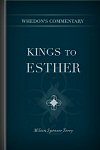
This volume covers seven canonical Old Testament books. Clear and comprehensive, it provides both modern and ancient insight on the text. Its introductions cover each book’s historical value, themes, date and authorship, sources, contemporaneous literature, and history. Maps and illustrations are included.
This work grows in our estimation, the present volume being most every thing which could be asked for in a popular commentary.
—The Universalist Quarterly and General Review
Milton Spenser Terry was a Methodist Episcopal church clergyman who held pastorates from 1868 to 1884. In 1884 he was elected to the chair of Hebrew and Old Testament exegesis at the Garret Biblical Institution in Evanston, Illinois. In 1871 he was elected to the American Oriental Society, and in 1883 he was elected to the Society of Biblical Literature and Exegesis.
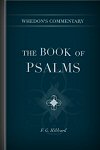
“No book in the sacred canon so intertwines itself with all other sacred books, and so interpenetrates all Bible history and prophesy, all secular and spiritual knowledge, as the Psalms.” In this volume, F. G. Hibbard focuses on the sacred lyrical poetry of Psalms, analyzing the language of the text and its many allusions. A strong focus is given to Psalms’ history, geography, archaeology, and interpretation.
With ample prolegomena discussing the chief points in criticism, and with well-condensed historical and critical introductions to the different Psalms, the several verses are clearly interpreted, with short and striking homiletic observations. The volume is a delightful addition to the abundant literature upon these inspired hymns, which have been the comfort and inspiration of devout hearts in all ages.
—Zion’s Herald
It is a conscientious, painstaking, scholarly commentary, adapted to general use, and also worthy a place in the libraries of ministers and students. We know of no man who would give more devoted and honest labor to such a work than Dr. Hibbard.
—California Christian Advocate
The introduction to this volume is scholarly, comprehensive, terse, and clear in style, and evinces the author’s capacity as a learned and judicious, critical and evangelical exegete.
—Christian Intelligencer
The introduction is a valuable treatise on historical, doctrinal, and prophetical aspects of the Psalms, the thorough study of which should not be omitted by the student who would avail himself of the author’s labors to aid him in acquiring a knowledge of this portion of the sacred Scriptures. The explanatory notes on the text are clear, concise, suggestive, and in every respect adapted to the purpose of exegesis.
—Northern Christian Advocate
The notes will be found clear, concisely complete, and with the numerous object-pictures very illustrative of the text. We cannot but believe that this will be a favorite volume with all our Bible readers and students.
—The Methodist Review
F. G. Hibbard was an ecclesiastic author and a Methodist Episcopal minister in Clifton Springs, New York.
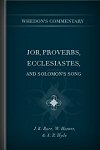
This volume includes comprehensive introductions to Job, Proverbs, Ecclesiastes, and Song of Solomon. It contains exegetical and explanatory notes, illustrations, and tables.
The introductions to the several books are models of concise and forcible statement, and the list of books consulted enables the reader to carry the study of particular passages as far as is needful.
—The Christian Advocate
It is brief, yet full; concise, but not meager. It is sufficiently critical for the scholar, yet sufficiently popular for the unlearned reader . . . brings the latest results of biblical scholarship within the reach of all.
—Canada Methodist Magazine
The reader . . . will find, however, candid and comprehensive statements in regard to the authorship and contents of these portions of the Scriptures, carefully analyzed and clearly presented.
—New York Observer
J. K. Burr was a Methodist Episcopal minister.
W. Hunter was a Methodist Episcopal minister in South Dakota.
A. B. Hyde was a professor of ancient languages at Denver University.
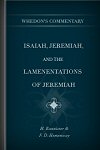
This exegetical commentary covers three prophet books. Full of sound biblical criticism and research, it includes book introductions, charts, outlines, and illustrations.
H. Bannister was a professor at the Garrett Biblical Institute.
F. D. Hemenway was a professor of exegetical theology at the Garrett Biblical Institute.
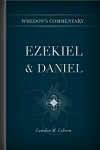
This commentary on Ezekiel and Daniel uses historical and archaeological references to unpack each prophetic book’s message, making “plain the sermons and visions that may seem obscure to modern readers.” The volume includes comprehensive introductions on Ezekiel and Daniel’s background, meaning, and significance.
The book is scholarly and reliable, gives both sides of all disputed questions, is written in a charming style . . . is reverent, conservative, and sound.
—The Union Seminary Review
Camden M. Cobern was a traveler, scholar, writer, and lecturer. He was the Thoburn Chair of English Bible and professor of philosophy of religion at Allegheny College in Meadville, PA.
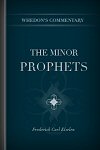
Discover the historical and contemporary value of the Old Testament’s prophetic books. In this volume, author Frederick Carl Eiselen analyzes 12 prophetic books. Drawing from such scholars as Wellhausen, Nowak, Marti, Driver, Cheyne, and Kirkpatrick, Eiselen provides readers a better understanding of prophetic teaching. Each book introduction includes the prophet’s biography and the text’s historical background, contents, and teaching.
One of the best of the Old Testament series. Its introductions . . . are abreast with modern scholarship, with which they show intimate acquaintance. For the most part conservative, yet some of the notable results of philological and historical inquiry are welcomed and acknowledged, thus throwing new light upon the sacred text.
—Southern Methodist Review
Is written by a scholar young indeed in years, but admirably qualified by temperament, religious feeling, and accurate, extensive scholarship for the task. . . . I do not hesitate to say that no worthier piece of sound and sane exegesis has passed beneath my eyes this many a day. . . . I congratulate Eaton & Mains upon the excellent making of a most excellent book, and upon their courage in putting forth a book so distinctly modern in tone, but with so sane and cautious a conserving of the whole word of God.
—The Church School Journal
This commentary by Dr. Eiselen is specially adapted to the needs of busy pastors, teachers in Bible classes and institutes, in Sunday schools, and for all others who seek to understand the so-called Minor Prophets, their message, the times in which they lived, and the spiritual truth revealed. No work on the Minor Prophets is better adapted than this for popular use. And yet the critical student will find this work equal to the best, for whatever light has been shed on the Sacred Word by specialists has here been focused by an expert hand, so that in every respect this commentary is abreast of the foremost scholarship. It is really a great work and will be eminently useful.
—The Methodist Review
Frederick Carl Eiselen was a professor at the Garrett Biblical Institute in Evanston, Illinois.
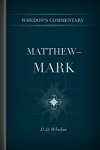
This volume provides a comprehensive analysis of the first two New Testament Gospels. Whedon’s commentary on Matthew and Mark includes an introduction to the New Testament, brief introductions to each Gospel, and illustrations.
The comments are concise and to the point. Difficulties are fairly stated and met. It will be a useful work, and deserves a wide circulation, outside of the bounds of the denomination, for which it was particularly prepared.
—The American Theological Review
There is no lack of logic, no dearth of learning, and no scarcity of philosophy and metaphysics. The work which the author undertook is thoroughly and exhaustively done. He attempted ‘the clear presentation of the meaning and spirit of the text itself;’ and this endeavor has been crowned with a rare and glorious success.
—The Methodist Quarterly Review
D. D. Whedon, one of the most important nineteenth-century American theological figures, was a professor of ancient languages at Wesleyan University. He was also an editor of the Methodist Quarterly Review for more than 20 years.
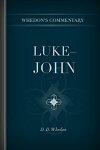
This commentary on Luke and John includes an introduction to the Gospels’ origins and mutual relations, as well as introductions to the authors and their Gospels’ historical background and sources.
D. D. Whedon, one of the most important nineteenth-century American theological figures, was a professor of ancient languages at Wesleyan University. He was also an editor of the Methodist Quarterly Review for more than 20 years.
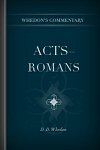
This volume provides an introduction to New Testament Greek and introductions to Acts’ and Romans’ authors, themes, and messages. It includes illustrations and book outlines.
In these days of prolix commentaries it is pleasant to read one that is concise and to the point.
—The American Presbyterian Review
D. D. Whedon, one of the most important nineteenth-century American theological figures, was a professor of ancient languages at Wesleyan University. He was also an editor of the Methodist Quarterly Review for more than 20 years.
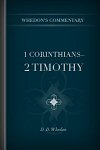
In this volume Whedon breaks down 10 Pauline epistles. He provides the historical, social, and religious contexts surrounding each text, illustrating each letter’s historical and contemporary significance.
The author has condensed into small space a large amount of material, and in aiming to be brief has not become obscure.
—W. L. Alexander
Of the numerous popular and portable commentaries which have appeared, this is undoubtedly the best. It is learned, clear, terse, and forcible, and imparts in a brief form a large amount of information. There is in it no parade of scholarship, yet only a scholar, and a ripe one, could have produced it. In all the qualifications essential to a commentator Dr. Whedon is second to none, so that he may be taken as a safe and sure guide of the Inspired Word.
—Wesleyan Methodist Magazine
D. D. Whedon, one of the most important nineteenth-century American theological figures, was a professor of ancient languages at Wesleyan University. He was also an editor of the Methodist Quarterly Review for more than 20 years.
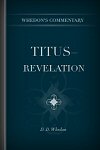
This volume provides commentary on the last 11 books of the New Testament. It includes introductions to each text, as well as numerous maps and illustrations.
The spirit is candid and liberal, while the conclusions are thoroughly evangelical.
—The British Quarterly Review
D. D. Whedon, one of the most important nineteenth-century American theological figures, was a professor of ancient languages at Wesleyan University. He was also an editor of the Methodist Quarterly Review for more than 20 years.
Reviews
5 ratings
Steven Wilson
5/30/2024
Logos, can you change the tabbing on this set? I have found if you own Philip Schaff's New Testament commentary, this set here, Whedon's commentary, will jump over (that is, to change over) to Philip Schaff's commentary. I think this is because both New Testament sets are called the same thing. I can't link Whedon's commentary to my Bible because when I change books, the Whedon set changes over to the Philip Schaff set. I find this discouraging and can't use it at all. Can you change the linkage / name / tabbing please?
David Potete
1/2/2017
Donald Wilburn
11/27/2016
john white
9/8/2012
the print type in the sample is very hard on the eyes,yet I am sure that the ideas are worth,suffering for.